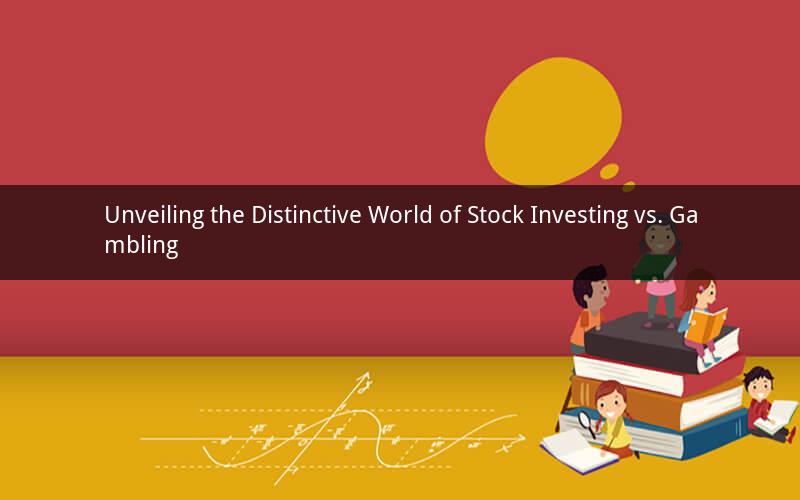
Investing in stocks and gambling might seem like two similar activities involving risk and potential reward. However, they are fundamentally different in their approach, principles, and outcomes. This article explores the key differences between investing in stocks and gambling, highlighting the factors that set them apart.
1. Objective and Purpose
Investing in stocks is a long-term endeavor aimed at achieving financial growth and securing a stable income. Investors analyze various factors, such as a company's financial performance, industry trends, and market conditions, to make informed decisions. The primary objective is to generate a positive return on investment over time.
On the other hand, gambling is a short-term activity driven by chance and luck. Gamblers place bets on uncertain outcomes, such as the roll of dice, the outcome of a sports match, or the spinning of a roulette wheel. The primary purpose is to win money quickly, often with little to no thought about long-term financial stability.
2. Risk Management
Investing in stocks involves risk management strategies to mitigate potential losses. Investors diversify their portfolios by investing in various sectors, industries, and geographical locations. They also set stop-loss orders to limit their losses if the stock price falls below a certain level.
Gambling, however, lacks a structured risk management approach. Gamblers often bet on a single outcome, which increases the likelihood of substantial losses. There is no systematic way to minimize risks in gambling.
3. Knowledge and Skill
Investing in stocks requires knowledge and skill to analyze financial statements, understand market trends, and make informed decisions. Investors must stay updated with industry news, economic indicators, and company earnings reports.
Gambling, on the other hand, relies on luck and chance. While some gamblers may have a basic understanding of the game they are playing, there is no need for extensive knowledge or skill to participate.
4. Timeframe
Investing in stocks is a long-term process that requires patience and discipline. Investors typically hold their stocks for several years or even decades, allowing the market to work in their favor. The time horizon for stock investing is often measured in years or decades.
Gambling is a short-term activity, with games lasting from a few minutes to a few hours. Gamblers often look for quick wins without considering the long-term consequences.
5. Potential Returns
Investing in stocks can generate substantial returns over time, especially if investors choose the right companies and market conditions are favorable. However, the potential returns are not guaranteed, and investors must be prepared for losses.
Gambling has a much lower chance of generating significant returns. While some gamblers may win large sums of money, the odds are stacked against them, and the probability of long-term success is low.
6. Emotional Impact
Investing in stocks can be emotionally challenging, as investors may experience ups and downs in their portfolio's value. However, successful investors learn to manage their emotions and make rational decisions based on analysis rather than emotions.
Gambling can have a more significant emotional impact, as the potential for instant wins and losses can be overwhelming. This can lead to impulsive decisions and potentially harmful gambling habits.
7. Social Impact
Investing in stocks can have a positive social impact, as it provides capital for businesses to grow, create jobs, and contribute to the economy. Investors can also support companies that align with their values, such as those focusing on sustainability or social responsibility.
Gambling, on the other hand, can have a negative social impact, as it can lead to addiction, financial hardship, and strained relationships. The potential for problem gambling is a significant concern in the gambling industry.
In conclusion, investing in stocks and gambling are two vastly different activities with distinct objectives, risk profiles, and outcomes. While both involve risk, investing in stocks offers a more structured, long-term approach to achieving financial growth and stability. Understanding the differences between these two activities can help individuals make informed decisions about their financial future.
Questions:
1. What are some common investment strategies used by stock investors?
2. How can individuals develop a disciplined approach to investing in stocks?
3. What are the potential benefits and drawbacks of diversifying a stock portfolio?
4. How can individuals distinguish between luck and skill in gambling?
5. What resources are available to help individuals overcome gambling addiction?